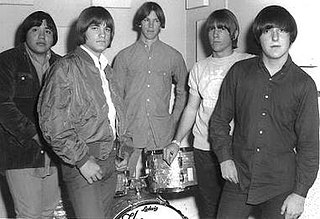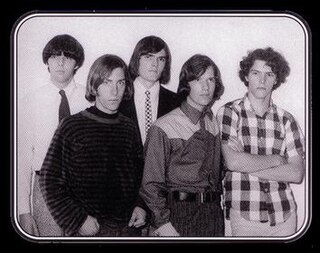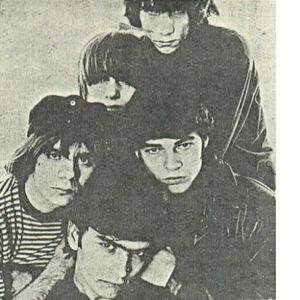Garage rock is a raw and energetic style of rock and roll that flourished in the mid-1960s, most notably in the United States and Canada, and has experienced a series of subsequent revivals. The style is characterized by basic chord structures played on electric guitars and other instruments, sometimes distorted through a fuzzbox, as well as often unsophisticated and occasionally aggressive lyrics and delivery. Its name derives from the perception that groups were often made up of young amateurs who rehearsed in the family garage, although many were professional.
? and the Mysterians are an American garage rock band from Bay City and Saginaw in Michigan, initially active between 1962 and 1969. Much of the band's music consisted of electric organ-driven garage rock and an enigmatic image inspired by the 1957 Japanese science fiction film The Mysterians. In addition, the band's sound was also marked by raw-resonating lead vocals of "?", making Question Mark and the Mysterians one of the earliest groups whose musical style is described as punk rock. Their music and imagery were highly influential on later bands.
The Gants was an American garage rock band that formed in 1964 in Greenwood, Mississippi, in the cultural and geographic Deep South.
The Choir was a garage rock band largely active in the greater Cleveland area from the mid-1960s into the early 1970s. Originally called The Mods, their largest commercial success came with the release of their first single "It's Cold Outside" in December 1966. The song, considered to be a classic of the garage rock era, was featured on Pebbles, Volume 2, one of the earlier garage rock compilation LPs. The flipside, "I'm Going Home" was included as a bonus track when the Pebbles album was reissued as a CD, and it can also be found on a garage rock compilation LP on Ohio bands, Highs in the Mid-Sixties, Volume 9. The Choir is well known for containing three of the four original members of Raspberries.

The Zakary Thaks were an American garage rock band from Corpus Christi, Texas, United States, which formed in the mid-1960s.
The Dovers were an American garage rock band of the mid-1960s. The Dovers were an example of mid-1960s folk rock, psychedelic rock and pop, heavily influenced by the British Invasion and American groups such as The Byrds.
The Del-Vetts were an American garage rock band formed in Chicago, Illinois, in 1963. They released five singles and obtained regional success in the Midwest.
The Sparkles were an American garage rock band from Levelland, Texas, that were active between 1957 and 1972. However, the most popular version of the band was the line-up that existed from 1965 to 1967, and which recorded the songs "No Friend of Mine" and "Hipsville 29 B. C."

The Banshees were an American garage rock band formed in Chicago, Illinois, in 1966. The group is best remembered for its sole single, featuring the dissonant proto-punk anthem, "Project Blue". The song has become a classic of the musical genre of garage rock and is featured prominently on several compilation albums.

Pebbles, Volume 11: Northern California is a compilation album featuring American underground psychedelic and garage rock music artists from Northern California that were active during the mid to late-1960s. It is a compact disc installment of the Pebbles series and was released on AIP Records, on April 24, 2007.

"Action Woman" is a song by the American garage rock band the Litter, written by their record producer Warren Kendrick, and first released as the group's debut single on Scotty Records in January 1967. The song also appeared on the band's first album Distortions. Although "Action Woman" never broke out on the national charts, it is now revered as a classic piece of the musical genre of garage rock. Accordingly, the composition has appeared on several compilation albums, and has been the subject of cover versions.

The Remains is the debut album by the American garage rock band the Remains, and was released on Epic Records in September 1966. Though the album was largely overlooked at the time of its original release, The Remains has since received recognition as one of the more cohesive efforts of the era.

Harbinger Complex was an American garage rock/psychedelic rock band from Fremont, California, who were active in the mid-1960s. In the years since their breakup, their work has come to the attention of garage rock fans and collectors and has appeared on several retrospective compilations including the Nuggets 4-CD box set. They are best-remembered for their 1966 song, "I Think I'm Down."

The Grains of Sand were an American garage rock band formed in Los Angeles, California in 1965. For a period, the group exerted a promising presence in Los Angeles's music scene, releasing three singles in their recording career, the second of which was produced by Kim Fowley. Much of the band's material found on their first two releases have since been compiled on several compilation albums, including Pebbles, Volume 1, and is cited by critics as classics of the garage rock genre.

Green Crystal Ties, Volume 10: 60s Garage Band Flasback is a compilation album featuring psychedelic and garage rock musical artists that recorded in the 1960s and early 1970s. It is the tenth and final installment of the Green Crystal Ties series and was released on Collectables Records on April 7, 1998. The album arguably features the most obscure musical artists featured in the series.

The Groupies were an American garage rock-psychedelic rock band from New York City who were active in the 1960s and are known for an innovative approach to primal blues-based rock exemplified in such songs as "Primitive". They were a popular fixture in the New York club scene and recorded for Atco Records, later venturing to Los Angeles. Due to their uncompromising stance the Groupies failed to attract a wider audience outside of their local enclaves. In recent years they have come to the attention of garage rock and psychedelic enthusiasts and their work has been included on various compilations such as the 1998 Nuggets four-CD box set, which was released on Rhino Records. In recent years their material has been re-issued on various garage rock and psychedelic compilations such as the Pebbles, Volume 10 LP and the 1998 Nuggets four-CD box set.

The Others were an American garage rock band formed in South Kingstown, Rhode Island, in 1964. Heavily influenced by British Invasion groups, the Others enjoyed a role as one of the most popular New England musical acts, thanks in large part to their debut single "I Can’t Stand This Love, Goodbye". The record is regularly featured on 1960s garage compilation albums, most notably Pebbles, Volume 8. Three singles, including "I Can’t Stand This Love, Goodbye", were released during the group's recording career, all of which were issued nationally, and represented musical progression unheard of from the majority of garage bands.

You Got Yours! East Bay Garage 1965-1967 is a compilation album featuring American garage rock bands that were active in the San Francisco Bay area between 1965 and 1967. It was released on September 18, 2007 on Big Beat Records and is the twenty-third installment of the Nuggets from the Golden State album series. Generally overshadowed by the garage scenes located in Los Angeles and San Jose, the San Francisco scene was uniquely influenced by the surplus of folk rock, which would eventually develop into psychedelic rock. For the most part, the groups presented on You Got Yours! do not exemplify the teenage-angst and rawness associated with the garage rock genre, but rather display a level of professionalism not expected from an adolescent band.

Distortions is the debut studio album by American psychedelic and garage rock band the Litter. It was released on May 1, 1967, by Warick Records and includes their hit single, "Action Woman.
William Penn Fyve were a garage rock group from Palo Alto, California who recorded the psychedelic classic "Swami". Their membership included Gregg Rolie and Mickey Hart.












